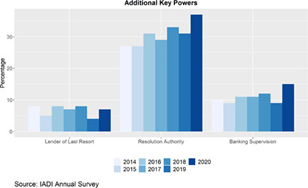According to the provisions of the amended Law on credit institutions in 2017, when credit institutions fall into one of four cases: Loss, risk of insolvency or loss, possible risk of insolvency according to regulations of the State Bank of Vietnam (SBV); The cumulative loss of a credit institution is greater than 50% of the value of charter capital and reserve funds recorded in the most recent audited financial report; Inability to maintain the prescribed capital adequacy ratio for a period of 12 consecutive months or a capital adequacy ratio lower than 4% for a period of 06 consecutive months; poor ratings for 02 consecutive years according to regulations of the SBV will be considered and decided by the SBV to be placed under special control.
In addition, Clause 38, Article 4 of the Law on credit institutions stipulates that specially controlled credit institutions can be restructured by the government, the Prime Minister or the SBV according to one of the following options: rehabilitation; merger, consolidation; transfer of all shares and capital contributions; dissolution; compulsory transfer; and bankruptcy. In particular, the mandatory transfer plan is the plan where the owners, capital contributing members, and shareholders of a specially controlled commercial bank must transfer all shares and capital contributions to the transferee.
According to Clause 39, Article 4 of the Law on credit institutions, the transferee is a domestic credit institution, foreign credit institution, or other investor that has requested to receive the mandatory transfer and has been decided by a competent state agency to receive compulsory transfer.
According to Article 151 of the Law on credit institutions 2010 and Clause 28, Article 1 of the amended Law on credit institutions in 2017, the forced transfer of specially controlled commercial banks is specifically regulated as follows: The SBV submits to the Government to decide on the transfer policy. Compulsory transfer of controlled credit institutions, especially commercial banks, to the transferee in accordance with the law when all the following conditions are met: Actual value of charter capital and negative reserve funds; at the request of the transferee. The order and procedures for deciding on the policy of compulsory transfer of specially controlled commercial banks are as prescribed in Clauses 2 and 3, Article 147a.
Accordingly, within 60 days from the date of receiving the proposal of the Special Control Board, the SBV shall consider and decide or submit to the Government and the Prime Minister for consideration and decision on the policy of restructuring credit institutions. special control. Within 30 days from the date of receiving the SBV's request, the government and Prime Minister shall consider and decide on the policy of restructuring specially controlled credit institutions.
The SBV issues a decision on mandatory transfer after the mandatory transfer plan is approved by the competent authority. The transferee exercises the rights of owners, capital contributing members, and shareholders at the commercial bank that is required to be transferred; Implement the approved mandatory transfer plan. According to Article 151b of the Law on credit institutions, specially controlled commercial banks after the transfer are required to carry out procedures to convert their legal form; procedures for changing owners, capital contributing members, shareholders; Implement the approved mandatory transfer plan.
According to the provisions of Article 151d of the Law on credit institutions, the receiving bank must meet a number of conditions. specifically, the transferee is a credit institution that has been operating profitably for at least 02 years immediately prior to the time of request to receive the transfer according to independently audited financial statements; meet the safety ratios specified in Article 130 of this Law; have a feasible mandatory transfer plan, which includes proof that the transferee has enough capital to make capital contributions according to the plan.
At the same time, the transferee that is not a credit institution has to meet the following conditions: Be a legal entity; meet the conditions specified in points a and c, Clause 1 of this Article.
Therefore, according to the provisions of the law mentioned above, how will the rights of depositors be resolved?
For banks that receive mandatory transfers, selected by the SBV, will also receive incentives such as tax exemptions and reductions during the transfer implementation period; incentives on capital structure, liquidity support as well as the right to restructure and restructure transferred banking operations; SBV will consider loosening the capital adequacy index and other incentives for a certain period of time to soon stabilize effective operations.
Specifically, according to the provisions of Article 151e of the Law on credit institutions, the transferee is the credit institution, has the following rights:
Own 100% of the charter capital of the compulsory transferred commercial bank in the case of the compulsory transferred commercial bank converting into a one-member limited liability company; may not be able to consolidate the financial statements of the required transferred commercial bank;
In case of compulsory transferred commercial banks, it is excluded when calculating the capital adequacy ratio; capital contributions to commercial banks that are transferred are not required to make provisions for devaluation of investments and are excluded when calculating capital contribution and share purchase limits of the credit institution receiving the transfer;
To sell and issue shares of credit institutions that receive transfer to foreign investors in accordance with the approved mandatory transfer plan; may apply one or several support measures specified in Article 148b of the Law on credit institutions according to the approved mandatory transfer plan.
For the transferred bank, according to regulations, from the time the SBV issues a decision on compulsory transfer, all rights and interests of the owners, capital contributing members, shareholders of commercial banks subject to force transfer will terminate.
As for customer deposits, when transferred, the receiving bank will receive all rights and obligations of the transferred bank, including loans, deposits, other debt obligations. The transferee bank will be responsible for the deposits and loans that the transferred bank borrows from other credit institutions.
For DIV, with assigned functions and tasks (according to the Law on deposit insurance), we will always closely monitor the developments of the transfer process and monitor the activities of the transferee bank to warn of the transfer process. Report possible risks, report to management agencies for timely correction, contributing to safe and effective banking operations.
Thus, according to the provisions of law as stated above, depositors can feel completely secure when the State conducts the mandatory transfer of weak banks. The transferee bank will be responsible for the customer's deposits, including the obligation to pay 100% of the deposit amount deposited in the bank that had to be transferred previously.
Communication Department



























